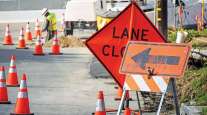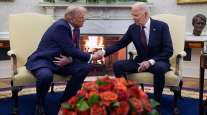Staff Reporter
Indiana Awards $101 Million for Local Roads, Bridges

[Stay on top of transportation news: Get TTNews in your inbox.]
The Indiana Department of Transportation and Gov. Eric Holcomb announced that local government agencies have received a combined $101 million in state matching funds to support road and bridge projects.
The funding, provided through the Community Crossings Matching Grant program, will be dispersed across 241 cities, towns and counties. A component of Holcomb’s Next Level Roads program, Community Crossings dedicates funding specifically for local road and bridge improvements.
“As we navigate through the challenges created by the COVID-19 pandemic, we’re as committed as ever to improving and building our state’s infrastructure,” Holcomb said. “I’m incredibly pleased that we’re able to fund all of the high-priority local road projects submitted in this round. Taking care of our local roads is key to making sure our communities remain attractive places to grow businesses and create careers.”

Holcomb
According to Indiana’s COVID-19 Dashboard, 404,935 positive cases have been documented in the state as of Dec. 9.
As a response to the revenue uncertainty brought on by the pandemic, INDOT moved the call for projects to September (it originally was scheduled for July). This past spring, some $126.5 million was announced through Community Crossings. The funding was distributed across 214 cities, towns and counties.
Since its creation by the Indiana General Assembly, Community Crossings has awarded approximately $830 million in state matching funds for construction projects. The $101 million recently awarded comes from the balance available in the state’s local road and bridge matching grant fund, as well as from revenue collected thus far in fiscal 2021.

McGuinness
“This is a tremendous win for our local partners,” INDOT Commissioner Joe McGuinness said. “Our continued partnership with Hoosier communities will deliver more high-priority local road projects in the coming year, many of which have been in planning for months or even years and wouldn’t be able to move forward now without the state’s funding commitment.”
The investments made through the Community Crossings program are meant to spur economic development, create jobs and strengthen local transportation networks. Eligible projects include road resurfacing and preservation, bridge rehabilitation and replacement, drainage work and Americans with Disabilities Act compliance efforts. According to the American Road and Transportation Builders Association’s 2020 Bridge Profile, some 6% of Indiana’s bridges are classified as structurally deficient.

In this special two-part year in review, we look at the technology and regulatory developments that will help you and your business in 2021. Transport Topics Reporter Eleanor Lamb and Managing Editor for Features Seth Clevenger discuss HOS, software, equipment and more. Hear a snippet, above, and get the full program by going to RoadSigns.TTNews.com.
Utility relocation, railroad crossing upgrades, bike paths, water and sewer line replacements, and projects that have been approved for federal funding are not eligible for the Community Crossings program.
To be considered for funding, local government agencies must provide matching funds from a source approved for road and bridge construction. Larger communities must match 50%, while smaller ones must match 25%. They also are required to submit an asset management plan approved by INDOT for maintaining existing roads and bridges.
The funding is meant to help smaller communities, although all Indiana government agencies representing cities, towns and counties may apply. State law requires that 50% of the available matching funds annually be awarded to communities within counties that have populations of 50,000 people or fewer.
Want more news? Listen to today's daily briefing:
Subscribe: Apple Podcasts | Spotify | Amazon Alexa | Google Assistant | More




